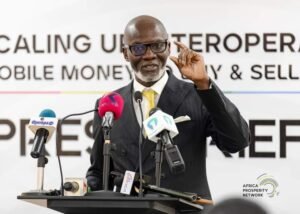Kenneth Ashigbey calls for collective effort in dealing with fibre cuts in Ghana

Chief Executive Officer of the Ghana Chamber of Telecommunications, Ing. Kenneth Ashigbey has called for a collective effort through sustained collaboration by all stakeholders to help curb the menace of fibre cut in the country.
He said the collective effort is needed to ensure that the menace is curbed completely or at least reduce the increasing incidents of frequent fibre to its barest minimum.
Operator data gathered by the Chamber of Telecommunications reveals that, there has been over 2000 fibre cuts within the last 6 months of the year 2019. These cuts which were caused mainly by road contractors, private developers, unknown criminals and other utility providers results in disruption of communication services with negative consequences for the country
In July this year, the Daily Statesman reported that MTN alone in 2018 recorded 1143 fibre cuts. The paper reported that MTN Ghana has threatened to sue road contractors, private developers, mining firms, utility service providers and all persons whose activities continue to cut their fibre leading to challenges with their quality of service.
Speaking to stakeholders at the third edition of the sensitization workshop to address the challenge of fibre cuts and damage to communications infrastructure organised by the Chamber of Telecommunications at Koforidua, the Eastern Regional Capital, Ing. Ken Ashigbey said the Eastern Region alone recorded over 220 cuts out of the over 200 cuts this year, costing the industry about ¢3.5million cedis.
He said the over ¢3.5million was expended without counting the cost of revenue loss, the non-traditional temporary solutions deployed as well as additional capital expenditure to keep network availability stable over the period.
The industry also recorded over 150,000 litres of diesel, and 240 batteries stolen from the cell sites with a whopping 18 million affected subscribers and businesses within the value chain.
“We cannot continue to accept this problem as the norm; therefore, we are here today to work with the stakeholders to agree a better way of doing things to reduce drastically the impact of these cuts, thefts and damage to our infrastructure” said Ing. Ashigbey.
The stakeholders sensitisation workshop organised at Koforidua is the third of it’s kind in the country. This follows similar event, which were launched in Cape Coast and Western Region in June and July respectively, highlighting the prevalence of fibre cuts, cable/fuel/battery thefts, and vandalism to the communications infrastructure.
The workshop brought together 40 stakeholders from the Road Agencies, Road Contractors, Utility Service Providers, Local Government, Regulators and others who work within the reservations or play critical roles in its management.
The meeting focused on rallying participants towards building an action plan that promotes effective collaboration and better coordination within the right of ways while preserving each other’s infrastructure.
Stakeholders agreed that strengthening the Regional Engineering Coordinating Team (RECT) and the District Engineering Coordinating Team (DECT) were essential to manage the Right of Way activities within the Metropolis, Municipalities and Districts.
Right of Way permitting was also discussed at the meeting to ensure better alignment between regulatory agencies and service providers to prevent the age-old problem of work being stalled by Assemblies seeking the source of authorization.


